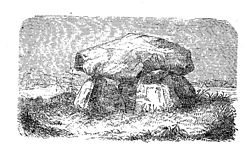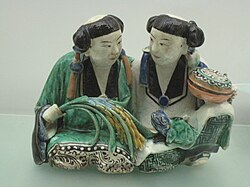Bhaga
Bhaga (भग) was the religion of the Boreo-Coians , which promoted a concept of earned immortality through reincarnation, a holy social order enforced by the gods, and the consumption of Myristica mel . This religious system probably emerged during the 18th or 17th centuries BCE as the Boreo-Coian Culture expanded into central and western Coius. There are few contemporary sources on Bhaga; much of its history is drawn from oral traditions recorded by later religious groups and from comparative analysis of religions thought to have descended from Bhaga.
Origins
Bhaga was promoted primarily by a Boreo-Coian nomadic warrior aristocracy which operated along the northern coast of Coius during the Galdian period of Zorasan. These nomadic kings did not form a cohesive state or a comprehensive pantheon, but it seems that many of them enjoyed mutual recognition. Henotheism emerged both as a method of gaining political legitimacy during conquests and as a way of showing respect to allies. Conquered peoples retained their own religious traditions; their gods were adopted into the greater mythos of the expanding Galdian culture. This system was upset during the decline of the Galdians as early Badawiyan civilization expanded into central Coius and displaced both the Galdians and Boreo-Coians. During this upheaval, many of the oldest sites of Boreo-Coian religious traditions were conquered by the Badawiyans. This prompted a bifurcation of the Boreo-Coian pantheon; the gods attached to land lost to the invaders were considered left-handed gods who could not be trusted and brought about suffering. The other gods were considered right-handed gods and protected order and happiness.
As the Boreo-Coians moved away from their ancient homelands, they established two deities who represented the division between the two kinds of spiritual powers. The Divine Twins were brothers who patronized all other gods, each representing half of the spirits of the world. They were not greater than all other deities--though were doubtless enlarged through their preeminent position in the pantheon--but acted as mediators between the two worlds. As the Boreo-Coians expanded, they assigned newfound spirits to one of the twins, after which it became a permanent fixture of that locality. Right-handed gods had to be obeyed and worshiped while left-handed gods had to be appeased and feared. Other than this theological divide, however, many religious observances were the same for both kinds of spirit and both had priests assigned to them.
Right-handed, or Dzathe, gods had a strict social order. This could have emerged because of the many linguistic and cultural traditions that were periodically under the control of Boreo-Coian kingdoms as a way to reconcile many social needs across large amounts of time and space. This also solidified the importance of the ruling class by making them comparable to the Divine Twins.
Left-handed, or Madze, gods had the power to upset social order and often did so when they did not receive adequate attention from the population. A rebellion or a famine was often taken as a sign, not that the people were rebellious, but that a king had failed to mediate with the Madze gods.
Characteristics
- Realization (बना, bana) -- the process of achieving a second life through reincarnation through pious actions in this life.
- Divination -- priestly art of determining if someone is a new soul or a reincarnation and who someone is a reincarnation of.
- Searching -- the journey of past-self discovery which takes place when a priest does not who has been reincarnated.
- Worship -- observing the customs associated with the gods, especially the twin brothers of heaven.
- Construction (समाधि, samadhi) -- the creation of dolmen to honor past lives, in a more general sense, respect for ancestors.
- Horse sacrifice (अश्वमेध, asvamedha) -- respect for and occasional sacrifice of horses in order to ensure heaven's acknowledgement.
- Unborn (अजन्म, ajanma) -- observing the customs associated with those born through c-sections.
Legacy
- Satyism as a reaction to Realization.
- Qariban valley is full of the dolmen of past kings and warriors.

